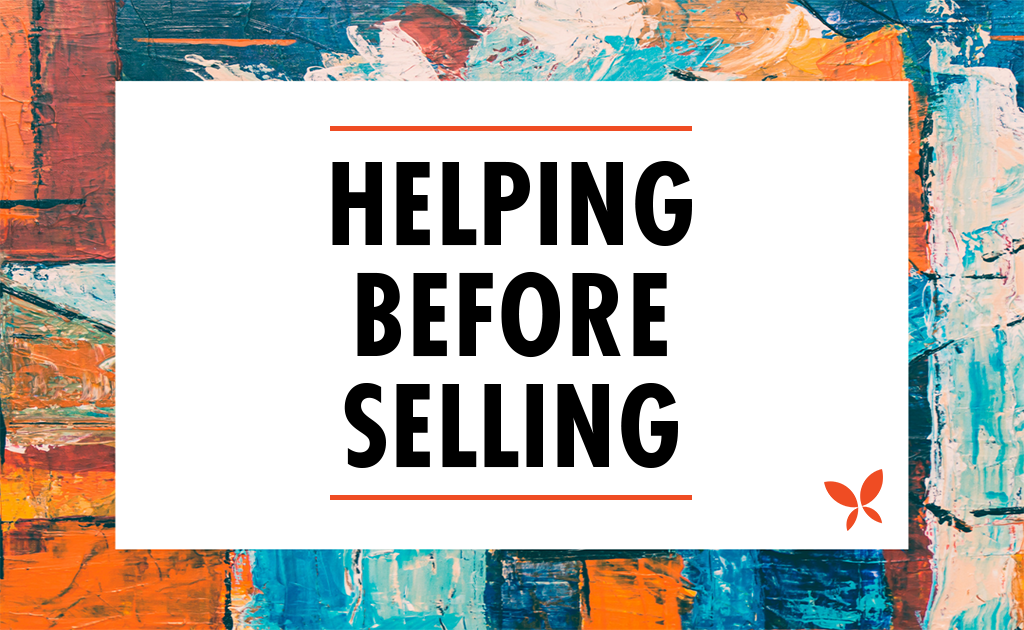You look up a lot of stuff on Google, right?
Chances are, your searches fall into one of three categories: Looking for information; looking to make a purchase; and looking information in order to make a purchase.
From a seller’s perspective, the first one, say, an inquiry into why kangaroos have pouches, isn’t particularly relevant. The second one typically occurs AFTER the customer has done their research and made a decision.
It’s the third one that’s the sweet spot for selling online.
Providing needed info – that’s where the right approach can effectively influence a buyer.
Sure, you’ll promote your product or service’s features and benefits on your website, as you see them. But if that’s all you’re doing, you’re leaving a lot of opportunity on the table.
Sharp marketers know it’s best to HELP a prospect before trying to SELL to them.
Nominally, we should be objective rather than salesy in educating the customer, so they can make the right choice for themselves. But if you guide that person toward the smartest TYPE of solution, rather than your specific offerings, they will be drawn to (your) products of that type.
Plus, it’s human nature for humans to reciprocate when someone helps them solve a problem or reach a goal.
So, where can you provide all this genuine help?
A company’s blog is the traditional place to provide relevant information to buyers in research mode. By using SEO keywords that reflect customers’ buying questions or product-related issues, this tactic can also bring in readers who otherwise wouldn’t have found you.
It’s okay to include an offer of further help, with a link to an online selling page or contact form – as long as that pitch is at the bottom or otherwise set off from the main content.
Speaking of online selling pages…
Relevant but generic tips, ideas and insights also make sense on the product and service pages that your web visitors are already going to. Also, if you offer an alternative solution that doesn’t involve sending an invoice, you may not profit this time, but you’ll win a fan – and potential referrer – for the future.
A garage door service company suggests changing your remote’s batteries before scheduling a service call for an unresponsive garage door. It’s certainly a useful DIY tip – and one that prevents unprofitable trips to the homeowner’s house.
Revisit your email strategy.
Whether you’re cold-emailing prospects, or sending out regular messages to your list of contacts, perhaps using this avenue just to sing your product’s praises isn’t the best approach.
Try this: Send out three or four brief but genuinely helpful pieces of content for every one product pitch email. When they know there’s something in it for them, folks are a lot more likely to Open than Delete.
What about social media posts?
Sure! A series of genuinely helpful tips, with a link back to your website, can each be condensed to fit any platform’s character limit. Piping in with an intriguing comment on someone else’s post can also get folks to check out your profile.
When your competitors are trying to serve themselves by selling online, while you care enough to help other people online, who’s going to win more good will?
Have you ever contributed to an online forum or group discussion?
This is another great way to prove your expertise while gaining exposure for yourself and your company. If you’re a pro user of a software app, see if you can be one of the independent experts that other users can turn to when they can’t figure something out.
When someone has a question or is stuck on an issue that you can help solve, your answer will be noticed not only by the questioner, but by everyone in the group. If it turns out anyone there needs a contact or a referral for something you’re clearly an expert at, who knows what opportunity that might lead to?
Be an expert guest.
We’ve already talked about your own blog, but guest blogging for another blogger – hopefully one with a wider audience – can also get you on the radar of people who hadn’t known you or your unique expertise. Ask for a ‘follow’ link back to your company site to be included in the piece.
Being a podcast guest can offer similar potential rewards. The host will typically talk you up at the beginning or end of the session, letting all their listeners know what you’re great at, as well as the name of your company.
People love to buy, but they hate to be sold.
Sure it’s a cliché, but it also happens to be true. By helping online before selling online, you’re doing an end-run around people’s expectations.
What we might call “buyers’ armor” makes it our default to resist or ignore other companies’ sales pitches. But if one company offers genuinely objective help or insight for an issue that’s been plaguing us, well, that’s a bit harder to ignore – or forget.



